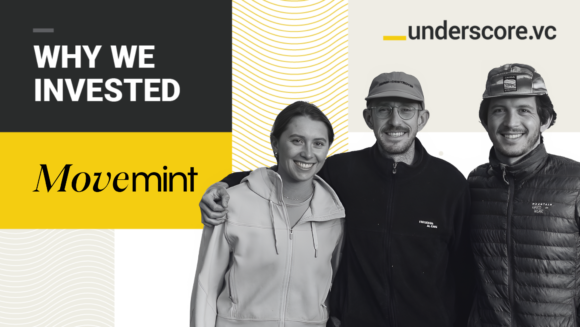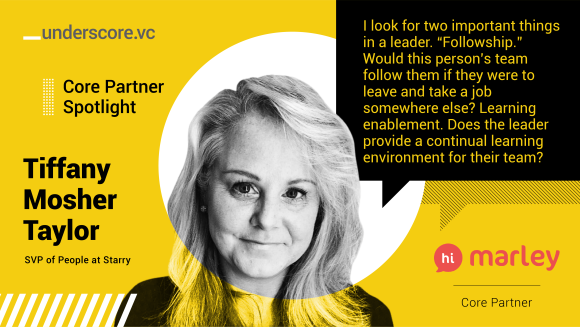At Underscore VC, we believe it takes a community to build an enduring, iconic company. That’s where the Underscore Core and our Core Partners come in. In this series, we’re featuring a handful of our Core Partners, sharing their insights, and describing their impact. Read on to learn more.
What’s been one of the most important factors in Salsify’s success? “An early and intentional focus on developing company culture,” says Rob Gonzalez, Co-founder and CMO of Salsify. “Culture is hard to get right, and it requires continual care. We’ve kept it front of mind from the beginning.”
As both an entrepreneur and a startup advisor, Rob has a unique perspective on building great companies. We’re thrilled to not only have Salsify in the Underscore portfolio but also to have Rob in the Underscore Core as a Core Partner to portfolio company Popcart, which creates tools that help people easily compare prices in seconds down to the unit price.
What’s a Core Partner? Core Partners work closely with Underscore VC to help source investment opportunities and/or advise portfolio companies. In return, Core Partners receive “Core Allocations,” a portion of Underscore’s returns on the company via an interest grant in our Core Fund. That means incentives are aligned for productive relationships—at zero cost to our founders.
These partners are tremendously valuable. In this quick Q&A, Rob shares insights from his time in the startup trenches.
Optimism > Grit
Q: As a co-founder, what’s something you’ve learned about grit?
A: When most people think about “grit,” they think about slogging through something unpleasantーthe whole “startup grind” thing. I don’t subscribe to that framing.
I’m a bigger fan of the concept of optimism. Optimism is a superpower. You can use it to frame nearly anything as worthwhile.
I’m not talking about blind optimism here. I’m talking about a functional belief that you will succeed and that things will get better, even in the face of adversity.
Jocko Willink, former Navy SEAL, has the best outlook on this: Good.
From Ramit Sethi’s newsletter:
Former Navy SEAL Jocko Willink developed a one-word response he uses every time he faces adversity: “Good.”
Didn’t get promoted? Good. More time to get better. Oh, mission got canceled? Good. We can focus on another one.
Didn’t get funded? Didn’t get the job you want? Got injured? Sprained your ankle? Got tapped out?
Good.
Company Culture Requires Continual Care
Q: What’s been one of the most important factors in Salsify’s success?
A: An early and intentional focus on developing company culture, and in particular on bringing in senior leaders that would work within and enhance it. Culture is hard to get right, and it requires continual care. We’ve kept it front of mind from the beginning.
Our culture has impacts outside of our walls. For one, our NPS scores are exceptionally high compared to our competition. For another, we can attract marquee talent like Mike Milburn, Salesforce’s (now former!) Chief Customer Officer and GM of Service Cloud, a $4.5B ARR SaaS business.
How to Bring in Early Sales and Marketing Leaders
Q: In advising startups, what are you asked most often?
A: The most frequent question has to do with staffing. In particular: What kind of person should run sales? Who should run marketing? Founders hear a wide range of suggestions, from “You should!” to “You’ve never done this before; bring in an experienced leader.”
In general, if a founder is dealing with a problem they don’t understand or don’t want to work through (think, cold calling), it’s tempting to want it to just “go away” by bringing someone in to run it. Unfortunately, this is a form of abdication, not delegation.
Even with strong talent from the outside, you must have command of the business motion. A good way to build that muscle is to be heavily involved in all go-to-market activity at the beginning, and even after bringing on leaders.
A Highlight as a Core Partner
Q: Can you share an “aha” moment from working with Popcart?
A: Early on, Omri Traub, Founder and CEO of Popcart, shared with me the data pipeline they had built to do SKU reconciliation across retailer sites. That is, this 28-oz Target-only detergent is equivalent to this 32-oz detergent on Amazon.
That type of comparison is incredibly difficult to do at any reasonable scale. (For context, Google doesn’t do this.) I immediately knew Popcart had a unique data asset that would be hard for others to replicate.
Interested in our Core Partner program? Learn more about the Underscore Core and our programs here.









